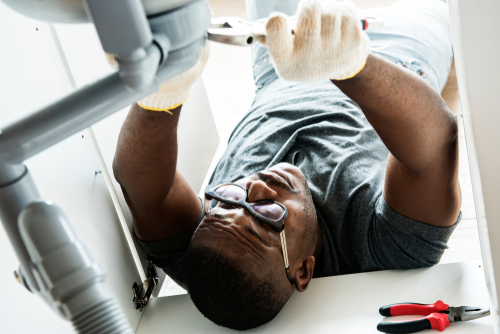Plumbers usually run their own businesses but can work for companies. Plumbing issues can involve many things: They fit and repair the pipes, fittings, and other apparatus of water supply, sanitation, or heating systems. It’s important to know that while plumbing covers water systems as well as central heating, different plumbers may differ slightly in the plumbing services that they offer. They often work independently, but sometimes they have an apprentice or helper with them.

Common plumbing issues
For some plumbers, their busiest day of the week is Monday because they fix all the failed DIY projects from over the weekend. The 10 most common plumbing issues are:
- Dripping faucets
- Slow draining sink
- Clogged bath or shower drain
- Clogged toilet
- Running toilet
- Faulty water heater
- Low water pressure
- Jammed garbage disposal
- Leaky pipes
- Sewer system backup
Almost every call is different, but toilet related problems and unblocking clogged drains are probably the most common chores. Service work and fixing things is the hardest type of plumbing work to do (new construction; building new houses, apartments, condos, sky scrapers). Each day there is paperwork: health and safety regulations, boiler guarantees to fill out, preparing and chasing invoices, new technical reports to read etc.
Plumbing challenges
No two days are ever the same, which says a lot in terms of service variety. Also, due to the very sudden and severe nature of many plumbing problems and call outs, it’s extremely difficult for a plumber to plan their day. Changes will often have to be made to schedules at the last minute for emergency call-outs and many plumbers will also have to work weekends. Customers often expect immediate service, but it is up to the plumber to have the necessary communication skills to manage client expectations. A plumber cannot always tell how long a job is going to take, so he has to take on as much work as he can in a day and communicate clearly to the client what is and is not possible before he starts the job.
Plumbers and other tradesmen often need to work together
The worst thing about plumbing is when plumbers have to work with other tradesmen who cause problems. For example, following a builder around who isn’t very good at his job can be very frustrating. Sometimes a plumber has to chase after a client who owes him money. Plumbing can take time away from family life, especially if the plumber is called out over the weekend for an emergency.
A critical risk factor for the plumbing industry is low margins (charging lower fees to customers, low profit) caused by non-compliant and unqualified competition who will do the work at even lower rates. Some bigger plumbing companies may be able to maintain enough margins (profits) to deal with issues such as health and safety requirements. But small plumbing operators often struggle to with comebacks and day-to-day operating expenses, which are too costly to properly reduce risks. The public often do not see value in plumbers’ skills and base their buying decisions purely on price.
Plumbing has health risks associated with exposure to sewage, toilets, sewers, and septic tanks, which can cause bacterial infections.
Why do people become plumbers? They usually do not like to sit behind a desk 8 hours a day. They need variety in what they do and they enjoy interacting with people. One plumber, Shevlin, says, “You’ve got to be able to get on with architects, surveyors, council officials and the clients. You can’t be too angry a person. You need a reasonable head on your shoulders and you’ve got to be dedicated … because the business won’t look after itself and as soon as you start letting people down the phone stops ringing.”
Plumbing industry regulation
Not all plumbing professionals see the value in knowing and complying with the industry standards and obtaining proper certification. Industry regulators like the Plumbing Industry Regulation Board (PIRB) and IOPSA guide, monitor, and regulate nationwide standards of operation and service delivery to protect plumbing service providers.


Paowafu
#Guys if you happen to be near in Durbanville, you can try this plumbing services for emergency purposes https://uptasker.co.za/b/plumber-in-durbanville